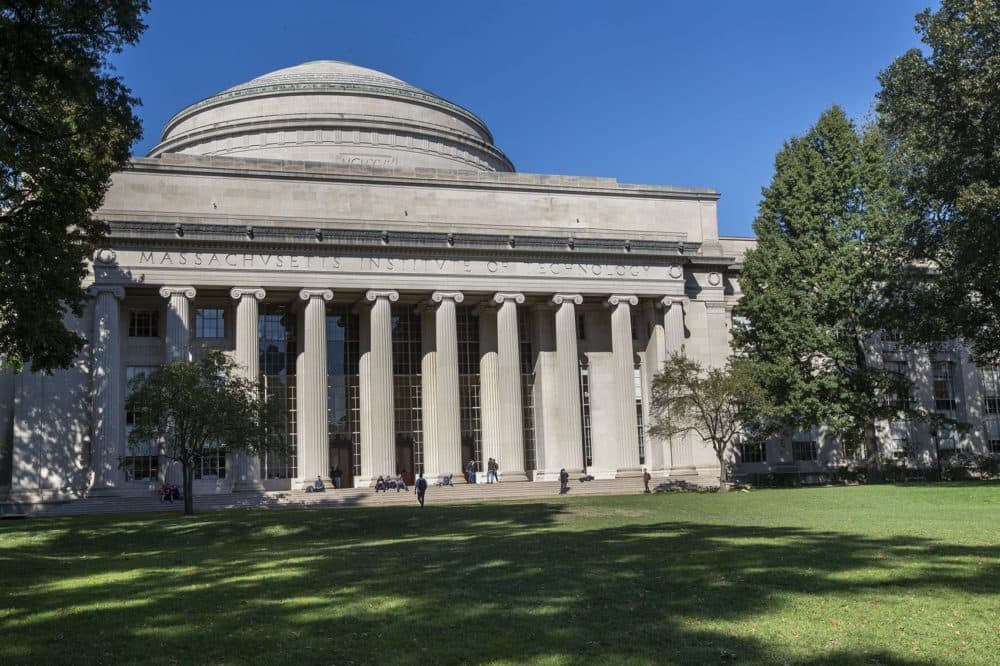Advertisement
MIT Faculty Rally Around Professor Charged With Concealing China Ties
Resume
The Jan. 14 arrest of MIT professor Gang Chen — on charges that he concealed his ties to China — has cut deep on his home campus.
More than 200 faculty colleagues have signed an open letter in support of Chen, saying that the charges are out of proportion with the offense and will do harm to science and the open university.
Professor Yoel Fink organized the push for that letter. He described his relationship with Chen is more professional than friendly; Fink works in materials engineering, while Chen studied nanotechnology in another department. But Fink thought highly of him all the same.
“I knew Gang to be a very prominent scientist, a really awesome educator, and a very central member of our community," he said.
Fink said he was aghast as he reviewed the federal complaint filed against Chen earlier this month.
“Most of the time, the more you read, the more you understand. In this case, the more I read of that complaint, the less I understood,” Fink said.
Chen stands accused of failing to report professional and financial ties to Southern University of Science and Technology — or SUSTech — a public university in Shenzhen, China, even as he sought, and was awarded, grants from U.S. federal agencies.
Fink said the life of a research lead involves a great deal of paperwork, and he could easily accept that Chen — like himself, or most other colleagues — is capable of clerical errors. But those errors can be adequately addressed with revisions and fines, rather than with the charge of wire fraud now facing Chen, according to Fink.
“The issue we have is bringing the legal machinery developed to deal with organized crime — like wire fraud — into this arena of normal mistakes that normal people make, you’re going to create significant damage,” Fink said.
“Most of the time, the more you read, the more you understand. In this case, the more I read of that complaint, the less I understood.”
Professor Yoel Fink
If convicted, Chen could face up to 30 years in prison — though officials at the U.S. Department of Justice pointed to sentencing guidelines that made the prospect of incarceration highly unlikely in his case.
The faculty letter does not address the government’s contention that Chen instructed a colleague to remove his name from a list of scholars participating in the People’s Republic of China Talent Plan, instead presenting this as a case of simple misunderstanding.
The letter does note that neither Chen nor MIT sought to conceal the relationship with SUSTech, which awarded MIT $25 million in funding for research and construction on campus — like this 2018 article on the institute’s website.
Chen is just the latest among dozens of scholars charged as part of the U.S. Department of Justice’s “China Initiative,” which seeks to inhibit economic espionage and the theft of intellectual property by the Chinese government. That initiative was launched by then-Attorney General Jeff Sessions in 2018, and prosecuted locally by outgoing U.S. Attorney Andrew Lelling, a Trump appointee. Charles Lieber, a chemistry professor at Harvard, was charged with similar crimes a year ago.
But more than a defense of Chen or of his honesty, the letter’s signatories are concerned with principles. Peter So, a biomedical engineer who worked in the same department as Chen, said that with its language of "theft," the China Initiative fundamentally misunderstands both research and international collaboration.
So notes, for example, that no classified work takes place on MIT’s campus.
“There is no secret research [here]. If we sign a contract with a U.S. company to do any research, one of the stipulations is that the faculty can always publish” any results that are deemed significant, he said.
So is not naive about the geopolitics at work here, saying there is a “natural competition” for technological know-how between the United States and a rising power like China. But he said it's not the “zero-sum game” that it appears to be in the Trump administration's rhetoric.
For instance, So has taken part in a 16-year collaboration with the National University of Singapore. It is true, he said, that NUS’s international standing has improved during that collaboration — and in part because of it.
“At the same time, from the U.S. researchers’ point of view, [we] see our university as a way to export talent everywhere," he said.
Lelling’s office has been emphatic that they're not trying to limit international research sharing — only to make sure it's conducted transparently and in keeping with federal law.
But So has already noticed some chilling effects from the initiative. He recalled a recent conversation with a Chinese-born graduate student nearing the end of his time at MIT.
The student may try working at a startup, or seek a postdoctoral appointment, “[but] what he told me, which is a little bit surprising, is that if he wants to do a postdoc, he’d probably want to go to Europe, and not stay in the U.S.,” So said.
What made it surprising, So added, was remembering the determination with which foreign-born scientists of his generation sought a place at American universities.
So has no plans to leave MIT himself, but said he's rethinking the wisdom of a planned collaboration with scholars in his native Hong Kong. He also holds out little hope that the Biden administration will substantially change course, having repeatedly signaled a tough-on-China stance during its opening weeks.
In other words, the chilling effect has already begun, with no end in sight. So says he hopes the free exchange of ideas will not be a permanent casualty of this geopolitical moment.
“The rise of national competition — of nationalism, not just in this country — it makes what we think of as the open university model very difficult,” he said.
This segment aired on January 29, 2021.
